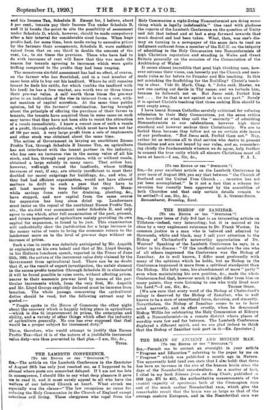THE LAMBETH CONFERENCE.
[To THE EDITOR OF THE " SPECTATOR."] Elnk—The article on the Lambeth Conference in the Spectator of August 28th has only just reached me, as I happened -to be abroad where posts are somewhat delayed. If I am not too late in consequence, I should like to say what deep pleasure it gave me to read it, and it must surely appeal to all who have the welfare of our beloved Church at heart. What struck me especially was the clause—" The law recognizes no cause for refusing the Holy Communion in the Church of England except notorious evil living. Those clergymen who repel from the Holy Communion a right-living Nonconformist are doing some- thing which is legally indefensible." One read with gladness the reports of the Lambeth Conference on the question of Unity and felt that indeed and at last a step forward towards that much desired end had been taken. What, then, was one's dis- may on turning to a newspaper of the same date to read an indignant outburst from a member of the E.C.U. on the iniquity of admitting to the Holy Communion two Nonconformists of high Christian reputation and standing in Wales and Great Britain generally on the occasion of the Consecration of the Archbishop of Wales!
It seems almost incredible that good high thinking men, how- ever extreme their views, can honestly put the Church and man- made rules so far before its Founder and His teaching. Is this not mistaking the Scaffolding for the Building? Christ's teach- ing is clear. Vide St. Mark, Chap. 9, " John said, Master, we saw one casting out devils in Thy name; and we forbade him, because he followeth not us. But Jesus said, Forbid him not . . for he that is not against us is on our part." Surely it is against Christ's teaching that those seeking Him should be sent empty away.
I have heard Roman Catholics severely criticized for refusing admission to their Hely Communions, yet the same critics are horrified at what they call the " enormity " of admitting Nonconformists to our celebrations, however high their standard and however zealous their Christianity. We are to forbid them because they follow not us on certain side issues of our profession. " But Jesus said, Forbid them not." Nay, rather let us welcome all to that service who desire to present themselves and are not bound by our rules, and so, remember- ing chiefly the fundamentals whereon we do agree, help further to cement the true unity which all sincere Christians must all have at heart.—I am, Sir, &c., F. A. L.


































 Previous page
Previous page